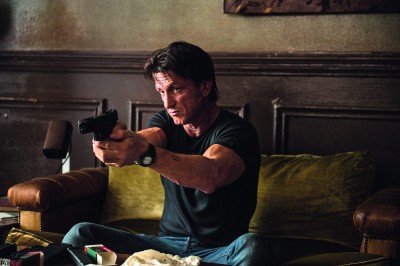
Of the approximately 20 film critics who attended the screening for Pierre Morel’s “The Gunman,” only one was a woman. This serves as an excellent suggestion of the film’s target (excuse the pun) audience. “The Gunman” is a man’s movie, so much so that if Ernest Hemingway were alive and writing movie scripts, he would most likely concoct one similar to what writers Don MacPherson and Pete Travis have put together. The film draws from the author’s famous trademarks: a white, male protagonist abroad, a benevolent nurse (upgraded to doctor to lessen the blow of another of Hemingway’s trademarks — misogyny) as a love interest, the beautiful European countryside and even a bullfight in Barcelona. Unlike Hemingway’s works, however, “The Gunman” lacks a deeper meaning, even as it tries to derive a political statement from its own American expat’s cautionary tale.
The film starts in 2006, when a prominent political figure in the Democratic Republic of Congo decides to sever all ties to the mining corporations that are digging up precious resources for their own gain while a devastating civil war wreaks havoc over the country. There is evidence that these corporations are financing rebels to extend the conflict, so the man’s political move is a smart one to supporters of conflict resolution and peace.
One such supporter is Annie (Jasmine Trinca), an Italian expat working as a volunteer doctor in the DRC and, more importantly, the loving girlfriend of the film’s protagonist, Jim Terrier (Sean Penn). The two are madly in love, much to the disappointment of Felix (Javier Bardem), who is obviously in love with Annie. For her part, Annie is naïve of their secret project. Jim is a mercenary hired by one of the mining companies to prolong conflict in the DRC, and Felix is part of his team. When that political leader makes his decision, Jim is forced to kill him (by order of his contract) and then flee the continent, as well as poor, ignorant Annie.
This act of violence haunts Jim for the next eight years, when the story picks up again. Seemingly as penance for his sins, Jim is working with expats and natives to supply clean water to a village in the DRC when three armed men come after him.
Unsurprisingly, thanks to superior combat skills, Jim escapes, discovering he is being hunted for his involvement in the assassination. In his search to find out who exactly is trying to kill him, he encounters Felix in Barcelona, along with Annie, to whom Felix is now married.
Of course, Annie married Felix only out of thanks for protecting her after Jim’s abandonment. Her heart has truly always belonged to Jim. Though this scenario is problematic to say the least, the chemistry between Penn and Trinca is undeniable. Their reunion feels realer than most of the stunts pulled during the film’s many action sequences.
That is not to say these sequences are anything less than pure spectacle. Morel, who also directed the first “Taken,” knows how to create suspense with his action, and Penn’s prowess as a tough-guy hero is as solid as his body, which he gladly shows off in a distracting number of shirtless scenes.
In lesser shape is Jim’s brain, which is diagnosed early in the film with a syndrome that mimics early-onset Alzheimer’s in memory loss, confusion and incurability. At a certain point in every fight, Jim starts to lose focus, sometimes puking blood or passing out for several hours at a time. This is, as one might imagine, exceedingly inconvenient for a man on the run from assassins. It is also the best aspect of the film. Not only does it create conflict for the protagonist, but explains why he is such a major target. Because of his failing memory, he’s kept journals and logs of all the illegal activity from his mercenary days.
It also gives Penn a juicy role to work with, and he carries the entire movie on his sculpted shoulders. Unfortunately, so much work is put into characterizing Jim that it seems the writers overlooked everyone else. Bardem’s Felix is uncharacteristically one-dimensional for the talented actor, and Idris Elba, though billed as a supporting star, has two scenes in the entire movie and is underused in his role as an Interpol agent.
Though Ray Winstone does a commendable job as Jim’s tough-as-nails-with-a-heart-of-gold buddy Stanley, second billing should have gone to Trinca. Annie is in many ways a thankless role, but Trinca never makes a false step. Perhaps if this were a different story, Trinca’s expressive eyes could project more than just the requisite adoration or fear.
But this is not that kind of movie. No, this is a knock-off Bond blockbuster that tries and fails to make a statement about civil unrest in Africa. The idea that European and American corporations need to stop profiting off devastating wars in Africa is not ignoble, but one wonders if such a point would have been better made in a film about a child soldier or a villager in the DRC, rather than an American mercenary doing the profiting.
That said, “The Gunman” is entertaining. The action is fun and suspenseful. If only its message didn’t weigh down the suave glee of a testosterone-fueled, cross-country manhunt, it could have been a real “guy’s movie.”























































































































